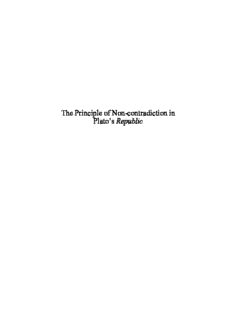
The Principle of Non-Contradiction in Plato’s Republic: An Argument for Form PDF
Preview The Principle of Non-Contradiction in Plato’s Republic: An Argument for Form
The Principle of Non-contradiction in Plato’s Republic The Principle of Non-contradiction in Plato’s Republic An Argument for Form Laurence Bloom LEXINGTONBOOKS Lanham•Boulder•NewYork•London PublishedbyLexingtonBooks AnimprintofTheRowman&LittlefieldPublishingGroup,Inc. 4501ForbesBoulevard,Suite200,Lanham,Maryland20706 www.rowman.com UnitA,WhitacreMews,26-34StannaryStreet,LondonSE114AB Copyright©2017byLexingtonBooks Allrightsreserved.Nopartofthisbookmaybereproducedinanyformorbyany electronicormechanicalmeans,includinginformationstorageandretrievalsystems, withoutwrittenpermissionfromthepublisher,exceptbyareviewerwhomayquote passagesinareview. BritishLibraryCataloguinginPublicationInformationAvailable LibraryofCongressCataloging-in-PublicationDataAvailable ISBN978-0-7391-9023-4(cloth:alk.paper) ISBN978-0-7391-9024-1(electronic) TMThepaperusedinthispublicationmeetstheminimumrequirementsofAmerican NationalStandardforInformationSciencesPermanenceofPaperforPrintedLibrary Materials,ANSI/NISOZ39.48-1992. PrintedintheUnitedStatesofAmerica ToTalyaandBarryBloom,ingratitude Table of Contents Preface ix Acknowledgments xiii Introduction xv I.TwoProblems xv II.TheIntentionbehindThisBook xxix III.Aristotle xlii IV.ConclusionoftheIntroductionandChapterSummaries xlvii 1 KindsofKnowingandKindsofBeing 1 I.FirstPrinciples 1 II.ThePrinciple’sScope 5 III.HypotheticalKnowledge 7 IV.TheSoulThatKnows 13 V.TheUnityoftheSoul—AFirstLook 16 VI.TheInsubstantialityofSensibleThings—AFirstLook 18 VII.TheRationalPart—AFirstLook 22 VIII.KnowingandBeing 23 IX.Self-samenessandJustice—AFirstLook 26 X.AWayBeyondtheHypothesis? 28 XI.Transition 29 2 TheUnityoftheSoulinRepublicIV 31 I.TheProblemoftheSoul’sDivision 31 II.JusticeandtheQuestionof“ToorfromPrinciples” 36 III.TheLead-uptotheArgument 40 IV.TheArgumentDistinguishingDesireandReason (438e10–439d9) 54 vii viii TableofContents V.ReasonandUnity 60 VI.Spirit 68 VII.DesireandContradiction 71 VIII.Akrasia 73 IX.TowardJustice’sInternalEnd 78 3 TheInsubstantialityofSensibleThings 81 I.The“Contradictory”NatureofSensibleThings 81 II.Heraclitus(OnSamenessasSelf-sameness) 85 III.TheWaytoaPlatonicSolution,ofSorts 94 IV.TheDividedLine:ATextualClue 99 V.ImitationI:DoxaandtheUnderlyingThing(Being) 103 VI.TowardanInternalEndorGoodinGeneral 111 VII.ImitationII:DianoiaandtheOrderorStructure(What-it- is-to-be) 114 VIII.NegativeForms 125 IX.PureMathematics 128 X.TheInsubstantialityofSensibleThings 132 4 TheSoulasGoodinItselfinRepublicX 135 I.Introduction:The“Forms”ofArtifacts 135 II.ArtifactsandOrder 138 III.ArtifactsandExternalEnds 143 IV.TheImmortalSoul 156 V.TheEmbodied(Mortal)Soul 166 VI.Soul,State,andCosmos 169 Conclusion:BeyondtheHypothesis 173 I.Form 173 II.ThePrincipleofNon-contradictionI 177 III.Wholeness 180 IV.Soul 183 V.ThePrincipleofNon-contradictionII 187 VI.Conclusion 190 Notes 193 Bibliography 209 TextsandTranslations 209 Books,Articles,andCommentaries 209 Index 213 About 219 Preface We use reason to view the world. We call into question our own and one another’s reasons for believing in things. Using reason, we prove and dis- prove, agree and disagree, discuss and persuade; in short, we use reason to argue points. Perhaps most importantly, we use reason in our attempt to arrive at truth. But what happens when we call reason itself into question? Fromwhere,onemightask,doweevenderivetheabilitytoreason?Canwe argue for attributing a special status to the claims of reason? Does reason examineitself?Ifnot,whatfacultycouldbeusedtoexamineitanddoesthat facultyexamineitself?InthisbookIarguethattheclaimsofreasonandtheir justification are central concerns for Plato. This in itself is not a new claim. However, I argue that Plato is able to make sense of and justify the use of reason—anditsprivilegedroleinourlives—inamuchdeeperwaythanhas been recognized. I attempt to show how he does so by examining his use of andattitude toward afundamental principleof reason:thePrincipleof Non- contradiction(PNC). Even though hisisthefirstknownfullformulation of theprinciple,little attention has beenpaidto Plato’sstatementof andattitude toward thePNC; even less to any possible connection between this issue and the justification of first principles. It is likely that part of the reason for this is the attention paid to Aristotle’s longer and more thorough treatment of the principle in Metaphysics Γ. Yet, we have much to gain from looking into Plato’s treat- mentoftheprinciple.Indeed,thetwotreatmentsshedinterestinglightonone another,aswewillsee.PerhapsanotherpartofthereasonPlatohasnotbeen looked to in relation to the PNC and the justification of first principles of reasoningisthat scholars havetakenthePNCas formulatedin the Republic as an example of a metaphysical principle and not an epistemological one, some going so far as to claim that his is not a principle of reasoning at all. ix x Preface Thus, the problem of justification of first principles of reasoning—and the attendantproblemofcircularity—seemsnottoemerge.Isuggestthatsuchan attitudeismistaken.However,themistakeisnotintheclaimthatthePNCis primarily metaphysical, for Plato. On the contrary, on this point I am in agreement with what seems to be a dominant view in the contemporary scholarship. Yet, far from this excluding the principle from being a first principle of thinking—at least, a certain type of thinking—it actually en- hances it and, in doing so, brings the problem of justification of the first principles of reasoningto theforefront.Toput thepoint concisely:thoughts arethingsforPlato.Thus,thePNCisafirstprincipleofthoughts becauseit is a first principle of things—at least of certain thoughts and certain things. (We might note that a similar point is suggested in relation to Aristotle simply by noting that his longest and most thorough treatment of the PNC occurs in his Metaphysics and not in the organon.) One could add to this pointbynoticingthatthattheexplicitapplicationofthePNCintheRepublic is to the soul of the knower. This application already suggests a connection between thoughts and things as this case—the one in which the knower is also the object of knowledge—is the case where the two are hardest to distinguish. Atanyrate,thebestargumentfortakinghisuseofthePNCseriouslyasa way into the issue of first principles is to see what is gained from doing so. For this, at the start, I can only beg the reader’s indulgence as to see what comesoftheissuewillrequiresomework.Inshort,whatwewillseeisthat both thoughts and things presuppose and reveal the necessity of unity and, therefore,ofform.Thatis,thePNC,thoughafirstprincipleofacertainsort of reasoning, is not actually a first principle in the highest sense for Plato. Rather, it is grounded in a deeper sort of reasoning, one that does not func- tiondiscursively.Thus,notsurprisingly,pursuingthequestionoffirstprinci- plesinPlatoleadsonetotheforms.Framingtheprobleminthiswayallows ustoseethetextasawholeasprovidinganextendedargument—andoneof acertaintype—fortheexistenceofforms.Thecertaintypeofargumentthat wegetissuggestedbytheplaceofthePNCintheinquiry. Theargumentforformsthatemergesiscomplexanddifficult.Thereason forthisisinonesenseeasytosee:theargumentcannotbeanormal,discur- siveargument.Thatis,theargumentcannotbeonethatassumesthePNC,as ifit did soit would fallinto aviciouscircularity. Rather, as wewill see,the argument doesn’t rest on the truth of the PNC but, rather, on the very pos- sibility of our hypothesizing the principle in the first place. Our ability to hypothesizethePNC—andperhapsourinabilitynottohypothesizeit—isthe linchpin. When we ask questions such as, “to what objects does the PNC apply?” or, “how is it possible that we apply the PNC?” we are asking questionsthatleadustotheexistenceofform.
Description: